Pharmacological interventions for self-harm in adults
- PMID: 35608866
- PMCID: PMC8094615
- DOI: 10.1002/14651858.CD013669.pub2
Pharmacological interventions for self-harm in adults
Abstract
Background: Self-harm (SH; intentional self-poisoning or self-injury regardless of degree of suicidal intent or other types of motivation) is a growing problem in most countries, often repeated, and associated with suicide. Evidence assessing the effectiveness of pharmacological agents and/or natural products in the treatment of SH is lacking, especially when compared with the evidence for psychosocial interventions. This review therefore updates a previous Cochrane Review (last published in 2015) on the role of pharmacological interventions for SH in adults.
Objectives: To assess the effects of pharmacological agents or natural products for SH compared to comparison types of treatment (e.g. placebo or alternative pharmacological treatment) for adults (aged 18 years or older) who engage in SH.
Search methods: We searched the Cochrane Common Mental Disorders Specialised Register, the Cochrane Library (Central Register of Controlled Trials [CENTRAL] and Cochrane Database of Systematic Reviews [CDSR]), together with MEDLINE. Ovid Embase and PsycINFO (to 4 July 2020).
Selection criteria: We included all randomised controlled trials (RCTs) comparing pharmacological agents or natural products with placebo/alternative pharmacological treatment in individuals with a recent (within six months of trial entry) episode of SH resulting in presentation to hospital or clinical services. The primary outcome was the occurrence of a repeated episode of SH over a maximum follow-up period of two years. Secondary outcomes included treatment acceptability, treatment adherence, depression, hopelessness, general functioning, social functioning, suicidal ideation, and suicide.
Data collection and analysis: We independently selected trials, extracted data, and appraised trial quality. For binary outcomes, we calculated odds ratios (ORs) and their 95% confidence internals (CIs). For continuous outcomes we calculated the mean difference (MD) or standardised mean difference (SMD) and 95% CI. The overall certainty of evidence for the primary outcome (i.e. repetition of SH at post-intervention) was appraised for each intervention using the GRADE approach.
Main results: We included data from seven trials with a total of 574 participants. Participants in these trials were predominately female (63.5%) with a mean age of 35.3 years (standard deviation (SD) 3.1 years). It is uncertain if newer generation antidepressants reduce repetition of SH compared to placebo (OR 0.59, 95% CI 0.29 to 1.19; N = 129; k = 2; very low-certainty evidence). There may be a lower rate of SH repetition for antipsychotics (21%) as compared to placebo (75%) (OR 0.09, 95% CI 0.02 to 0.50; N = 30; k = 1; low-certainty evidence). However, there was no evidence of a difference between antipsychotics compared to another comparator drug/dose for repetition of SH (OR 1.51, 95% CI 0.50 to 4.58; N = 53; k = 1; low-certainty evidence). There was also no evidence of a difference for mood stabilisers compared to placebo for repetition of SH (OR 0.99, 95% CI 0.33 to 2.95; N = 167; k = 1; very low-certainty evidence), or for natural products compared to placebo for repetition of SH (OR 1.33, 95% CI 0.38 to 4.62; N = 49; k = 1; lo- certainty) evidence.
Authors' conclusions: Given the low or very low quality of the available evidence, and the small number of trials identified, there is only uncertain evidence regarding pharmacological interventions in patients who engage in SH. More and larger trials of pharmacotherapy are required, preferably using newer agents. These might include evaluation of newer atypical antipsychotics. Further work should also include evaluation of adverse effects of pharmacological agents. Other research could include evaluation of combined pharmacotherapy and psychological treatment.
Copyright © 2021 The Cochrane Collaboration. Published by John Wiley & Sons, Ltd.
Conflict of interest statement
KGW: is an editor for the Cochrane Common Mental Disorders Group, and senior editor for the Self‐Harm and Suicide Satellite of the group. SEH: is the joint co‐ordinating editor of the Cochrane Common Mental Disorders Group. She is funded by an Auckland Medical Research Foundation Douglas Goodfellow Repatriation Fellowship to develop and test a digital intervention for young people who engage in self‐harm. She is the Principal Clinical Advisor of the Suicide Prevention Office of the Ministry of Health for the New Zealand Government. GR: no declarations of interest to report in relation to this review PH: no declarations of interest to report in relation to this review TLTS: no declarations of interest to report in relation to this review ET: no declarations of interest to report in relation to this review KH: no declarations of interest to report in relation to this review
Figures



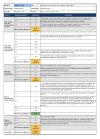
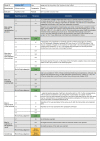
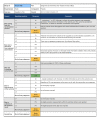
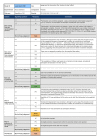

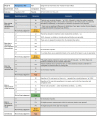
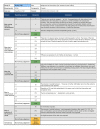
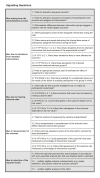
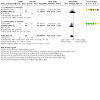

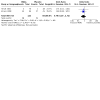
Update of
References
References to studies included in this review
Battaglia 1999 {published data only}
-
- Battaglia J, Wolff TK, Wagner-Johnson DS, Rush AJ, Carmody TJ, Basco MR. Structured diagnostic assessment and depot fluphenazine treatment of multiple suicide attempters in the emergency department. International Clinical Psychopharmacology 1999;14(6):361-72. - PubMed
Hallahan 2007 {published data only}
-
- Hallahan B, Hibbeln RJ, Davis JM, Garland MR. Omega-3 fatty acid supplementation in patients with recurrent self-harm: single-centre double-blind randomised controlled trial. British Journal of Psychiatry 2007;190:118-22. - PubMed
Hirsch 1982 {published and unpublished data}
-
- Draper R, Hirsch SR. Treatment of parasuicide patients with mianserin, nomifensine and placebo: a double blind placebo controlled trial. Unpublished manuscript 1982.
-
- Hirsch S, Walsh C, Draper R. Parasuicide: a review of treatment interventions. Journal of Affective Disorders 1982;4:299-311. - PubMed
Lauterbach 2008 {published and unpublished data}
-
- Lauterbach E, Ahrens B, Felber W, Müller-Oerlinghausen B, Kilb B, Bischof G, et al. Suicide prevention by lithium (SUPLI): challenges of a multi-center prospective study. Archives of Suicide Research 2005;9:27-34. - PubMed
-
- Lauterbach E, Felber W, Müller-Oerlinghausen B, Ahrens B, Bronisch T, Meyer T, et al. Adjunctive lithium treatment in the prevention of suicidal behaviour in depressive disorders: a randomised, placebo-controlled, 1-year trial. Acta Psychiatrica Scandinavica 2008;118:469-79. - PubMed
Montgomery 1979 {published data only}
-
- Montgomery S, Montgomery D, Jayanthi-Rani S, Roy D, Shaw P, McAuley R. Maintenance therapy in repeat suicidal behaviour: a placebo controlled trial. Proceedings of the 10th International Congress for Suicide Prevention and Crisis Intervention. Ottawa, Canada 1979;1:227-9.
Montgomery 1983 {published data only}
Verkes 1998 {published data only}
-
- Verkes RJ, Mast RC, Hengeveld MW, Tuyl JP, Zwinderman AH, Kempen GM. Reduction by paroxetine of suicidal behavior in patients with repeated suicide attempts but not major depression. American Journal of Psychiatry 1998;1555:543-7. - PubMed
References to studies excluded from this review
Bozzatello 2017 {published data only}
-
- Bozzatello P, Rocca P, Uscinska M, Bellino S. Efficacy and tolerability of asenapine compared with olanzapine in borderline personality disorder: An open-label randomized controlled trial. CNS Drugs 2017;31:809-19. - PubMed
Crawford 2018 {published data only}
-
- Crawford MJ, Sanatinia R, Barrett B, Cunningham G, Dale O, Ganguli P, et al. The clinical effectiveness and cost-effectiveness of lamotrigine in borderline personality disorder: a randomized placebo-controlled trial. American Journal of Psychiatry 2018;175:756-64. - PubMed
Domany 2019 {published data only (unpublished sought but not used)}
-
- Domany Y, Bleich-Cohen M, Tarrasch R, Meidan R, Litvak-Lazar O, Stoppleman N, et al. Repeated oral ketamine for out-patient treatment of resistant depression: randomised, double-blind, placebo-controlled, proof-of-concept study. British Journal of Psychiatry 2019;214:20-6. - PubMed
Grant 2016 {published data only}
-
- Grant JE, Chamberlain SR, Redden SA, Leppink EW, Odlaug BL, Kim SW. N-Acetylcysteine in the treatment of excoriation disorder: A randomized clinical trial. JAMA Psychiatry 2016;73:490-6. - PubMed
Grunebaum 2012 {published data only}
-
- Keilp JG, Ellis SP, Gorlyn M, Burke AK, Oquendo MA, Mann JJ, et al. Suicidal ideation declines with improvement in the subjective symptoms of major depression. Journal of Affective Disorders 2018;227:65-70. - PubMed
Marriott 2016 {published data only}
-
- Marriott BP, Hibbeln JR, Killeen TK, Magruder KM, Holes-Lewis K, Tolliver BK, et al. Design and methods for the Better Resiliency Among Veterans and non-Veterans with Omega-3's (BRAVO) study: a double blind, placebo-controlled trial of omega-3 fatty acid supplementation among adult individuals at risk of suicide. Contemporary Clinical Trials 2016;47:325-33. - PubMed
McCall 2018 {published data only}
-
- McCall WV, Pillai A, Case D, McCloud L, Nolla T, Branch F, et al. A pilot, randomized clinical trial of bedtime doses of prazosin versus placebo in suicidal posttraumatic stress disorder in patients with nightmares. Journal of Clinical Psychopharmacology 2018;38:618-21. - PubMed
NCT00065936 {unpublished data only}
-
- NCT00065936. Self-injury: diagnosis and treatment. clinicaltrials.gov/ct2/show/NCT00065936 (first received 5 August 2003).
NCT00533117 {unpublished data only}
-
- NCT00533117. Treating suicidal behavior and self-mutilation in people with borderline personality disorder. www.clinicaltrials.gov/ct2/show/NCT00533117 (first received 28 August 2017).
NCT00539188 {unpublished data only}
-
- NCT00539188. N-Acetylcysteine in adjunct to DBT for the treatment of self-injurious behavior in BPD. clinicaltrials.gov/ct2/show/NCT00539188 (first received 4 October 2007).
NCT01103180 {unpublished data only}
-
- NCT01103180. SSRIs and self-harm in borderline personality disorder. clinicaltrials.gov/ct2/show/NCT01103180 (first received 14 June 2019).
NCT01928446 {unpublished data only}
-
- NCT01928446. Lithium for suicidal behavior in mood disorders (Li+). clinicaltrials.gov/ct2/show/NCT01928446 (first received 26 August 2013).
NCT02039479 {unpublished data only}
-
- NCT02039479. Randomized, placebo-controlled multicenter trial of lithium plus treatment as usual (TAU) for acute suicidal ideation and behavior in patients with suicidal major depressive episode. clinicaltrials.gov/ct2/show/NCT02039479 (first received 17 January 2014).
Oquendo 2011 {published data only}
Yovell 2016 {published data only}
-
- Yovell Y, Bar G, Mashiah M, Baruch Y, Briskman I, Asherov J, et al. Ultra-low-dose buprenorphine as a time-limited treatment for severe suicidal ideation: a randomized controlled trial. American Journal of Psychiatry 2016;173:491-8. - PubMed
-
- Yovell Y, Bar G. Erratum for: ultra-low-dose buprenorphine as a time-limited treatment for severe suicidal ideation: a randomized trial. American Journal of Psychiatry 2016;173:198. - PubMed
References to studies awaiting assessment
NCT00834834 {published data only}
-
- NCT00834834. Comparing treatments for self-injury and suicidal behavior in people with borderline personality disorder. clinicaltrials.gov/ct2/show/NCT00834834 (first received 3 February 2009).
References to ongoing studies
NCT04005053 {unpublished data only}
-
- NCT04005053. Identifying biological signatures of N-Acetylcysteine for non-suicidal self-injury in adolescents and young adults. clinicaltrials.gov/ct2/show/NCT04005053 (first received 2 July 2019).
NCT04242914 {unpublished data only}
-
- NCT04242914. The effect of intravenous ketamine on non suicidal self injuries. clinicaltrials.gov/ct2/show/NCT04242914 (first received 27 January 2020).
Additional references
Albrecht 2014
-
- Albrecht B, Staiger PK, Hall K, Miller P, Best D, Lubman DI. Benzodiazepine use and aggressive behaviour: a systematic review. Australian and New Zealand Journal of Psychiatry 2014;48:1096-114. - PubMed
APA 2000
-
- American Psychiatric Association. Diagnostic and Statistical Manual of Mental Disorders, Fourth Edition, Text Revision (DSM-IV-TR). Washington, DC: American Psychiatric Association, 2000.
Beck 1961
-
- Beck AT, Ward CH, Mendelson M, Mock J, Erbaugh J. An inventory for measuring depression. Archives of General Psychiatry 1961;4:561. - PubMed
Beck 1974
-
- Beck AT, Weissman A, Lester D, Trexler L. The measurement of pessimism: the Hopelessness Scale. Journal of Consulting and Clinical Psychology 1974;42:861-5. - PubMed
Beck 1988
-
- Beck AT, Steet RA, Ranieri WF. Scale for Suicidal Ideation: psychometric properties of a self-report version. Journal of Clinical Psychology 1988;44:499-505. - PubMed
Bergen 2010
-
- Bergen H, Hawton K, Waters K, Cooper J, Kapur N. Epidemiology and trends in non-fatal self-harm in three centres in England, 2000-2007. British Journal of Psychiatry 2010;197:493-8. - PubMed
Brunner 2002
-
- Brunner J, Parhofer KG, Schwandt P, Bronisch T. Cholesterol, essential fatty acids, and suicide. Pharmacopsychiatry 2002;35:1-5. - PubMed
Bustamante‐Madsen 2018
-
- Bustamante-Madsen L, Eddleston M, Schultz-Hansen K, Konradsen F. Quality assessment of economic evaluations of suicide and self-harm interventions. Crisis 2018;39:82-95. - PubMed
Canner 2018
Carr 2016
Carroll 2014
Carter 2016
-
- Carter G, Page A, Large M, Hetrick S, Milner AJ, Bendit N, et al. Royal Australian and New Zealand College of Psychiatrists clinical practice guideline for the management of deliberate self-harm. Australian and New Zealand Journal of Psychiatry 2016;50:939-1000. - PubMed
Cipriani 2013a
-
- Cipriani A, Hawton K, Stockton S, Geddes JR. Lithium in the prevention of suicide in mood disorders: updated systematic review and meta-analysis. BMJ 2013;346:f3646. - PubMed
Cipriani 2013b
Claes 2007
-
- Claes L, Wandereycken W, Vertommen H. Self-injury in female versus male psychiatric patients: A comparison of characteristics, psychopathology and aggression regulation. Personality and Individual Differences 2007;42:611-21.
Corcoran 2015
-
- Corcoran P, Griffin E, O'Carroll A, Cassidy L, Bonner B. Hospital-treated deliberate self-harm in the western area of Northern Ireland. Crisis 2015;36:83-90. - PubMed
Courtney 2019
-
- Courtney DB, Duda S, Szatmari P, Henderson J, Bennett K. Systematic review and quality appraisal of practice guidelines for self-harm in children and adolescents. Suicide and Life-Threatening Behavior 2019;49:707-23. - PubMed
Curtin 2002a
-
- Curtin F, Elbourne D, Altman DG. Meta-analysis combining parallel and cross-over clinical trials. III. The issue of carry-over. Statistics in Medicine 2002;21:2161-73. - PubMed
Curtin 2002b
-
- Curtin F, Altman DG, Elbourne D. Meta-analysis combining parallel and cross-over trials. I. Continuous outcomes. Statistics in Medicine 2002;21:2131-44. - PubMed
De Beurs 2018
-
- De Beurs D, Vancayseele N, Borkulo C, Portzky G, Heeringen K. The association between motives, perceived problems and current thoughts of self-harm following an episode of self-harm: a network analysis. Journal of Affective Disorders 2018;240:262-70. - PubMed
Deeks 2019
-
- Deeks JJ, Higgins JP, Altman DG, editor(s). Chapter 10: Analysing data and undertaking meta-analyses. In: Higgins JP, Thomas J, Chandler J, Cumpston M, Li T, Page MJ, et al, editor(s). Cochrane Handbook for Systematic Reviews of Interventions version 6.0 (updated July 2019). Cochrane, 2019. Available from www.training.cochrane.org/handbook.
Dodds 2017
-
- Dodds TJ. Prescribed benzodiazepines and suicide risk: A review of the literature. Primary Care Companion CNS Disorders 2017;19:16r02037. - PubMed
Donner 2002
-
- Donner A, Klar N. Issues in the meta-analysis of cluster randomized trials. Statistics in Medicine 2002;21:2971-80. - PubMed
Easterbrook 1991
-
- Easterbrook PJ, Gopalan R, Berlin JA, Matthews DR. Publication bias in clinical research. Lancet 1991;337:867-72. - PubMed
Egger 1997
Elbourne 2002
-
- Elbourne DR, Altman DG, Higgins JP, Curtin F, Worthington HV, Vail A. Meta-analyses involving cross-over trials: methodological issues. International Journal of Epidemiology 2002;31:140-9. - PubMed
Engles 2003
-
- Engles JM, Diehr P. Imputation of missing longitudinal data: A comparison of methods. Journal of Clinical Epidemiology 2003;56:968-76. - PubMed
Erez 1996
-
- Erez A, Bloom MC, Wells MT. Using random rather than fixed effects models in meta-analysis: Implications for situation specificity and validity generalization. Personnel Psychology 1996;49:275-306.
FDA 2019
-
- US Food and Drug Administration. FDA approves new nasal spray medication for treatment-resistant depression. www.fda.gov/news-events/press-announcements/fda-approves-new-nasal-spray... Accessed 18 March 2020.
Ferrari 2014
Ferrey 2018
Fleiss 1994
-
- Fleiss JL. Measures of effect size for categorical data. In: Cooper H, Hedges LV, editors(s). The Handbook of Research Synthesis. New York, NY: Russell Sage Foundation, 1994.
Forte 2019
-
- Forte A, Buscaioni A, Fiorillo A, Pompii A, Baldessarini R. Suicidal risk following hospital discharge: a review. Harvard Review of Psychiatry 2019;27:209-16. - PubMed
Geulayov 2016
Geulayov 2019
-
- Geulayov G, Casey D, Bale L, Brand F, Clements C, Farooq B, et al. Suicide following presentation to hospital for non-fatal self-harm in the Multicentre Study of Self-Harm: a long-term follow-up study. Lancet Psychiatry 2019;6:1021-30. - PubMed
Gjelsvik 2014
GRADEpro GDT 2015 [Computer program]
-
- McMaster University (developed by Evidence Prime) GRADEpro GDT. Hamilton (ON): McMaster University (developed by Evidence Prime), accessed 26 June 2020. Available at gradepro.org.
Griffin 2014
-
- Griffin E, Arensman E, Corcoran P, Wall A, Williamson E, Perry I. National Registry of Deliberate Self Harm Annual Report. Cork, Ireland: National Suicide Research Foundation, 2014.
Hamilton 1960
Harrison 2014
-
- Harrison JE, Henley G, AIHW. Suicide and hospitalised self-harm in Australia: trends and analysis. Injury research and statistics series no. 93. Cat. no. INJCAT 169. Canberra: AIHW 2014.
Hawton 2003
-
- Hawton K, Hariss L, Hall S, Simkin S, Bale E, Bond A. Deliberate self-harm in Oxford, 1990-2000: a time of change in patient characteristics. Psychological Medicine 2003;33:987-96. - PubMed
Hawton 2004
-
- Hawton K, Harriss L, Simkin S, Bale E, Bond A. Self-cutting: patient characteristics compared with self-poisoners. Suicide and Life-Threatening Behavior 2004;34:199-208. - PubMed
Hawton 2007
-
- Hawton K, Bergen H, Casey D, Simkin S, Palmer B, Cooper J, et al. Self-harm in England: a tale of three cities. Multicentre Study of Self-Harm. Social Psychiatry and Psychiatric Epidemiology 2007;42:513-21. - PubMed
Hawton 2008
-
- Hawton K, Harriss L. The changing gender ratio in occurrence of deliberate self-harm across the lifecycle. Crisis 2008;29:4-10. - PubMed
Hawton 2010
Hawton 2013
-
- Hawton K, Saunders KE, Topiwala A, Haw C. Psychiatric disorders in patients presenting to hospital following self-harm: a systematic review. Journal of Affective Disorders 2013;151:821-30. - PubMed
Hawton 2016
Hayes 2016
-
- Hayes JF, Pitman A, Marston L, Walters K, Geddes JR, King M, et al. Self-harm, unintentional injury, and suicide in biolar disorder during maintenance mood stabilizer treatment: A UK population-based electronic health records study. JAMA Psychiatry 2016;73:630-7. - PubMed
Higgins 2011
-
- Higgins JP, Deeks JJ. Chapter 7: Selecting studies and collecting data. In: Higgins JP, Green S, editor(s). Cochrane Handbook for Systematic Reviews of Interventions Version 5.1.0 (updated March 2011). The Cochrane Collaboration, 2011. Available from handbook.cochrane.org.
Higgins 2019a
-
- Higgins JP, Eldridge S, Li T, editor(s). Chapter 23: Including variants on randomized trials. In: Higgins JP, Thomas J, Chandler J, Cumpston M, Li T, Page MJ, et al, editor(s). Cochrane Handbook for Systematic Reviews of Interventions version 6.0 (updated July 2019). Cochrane, 2019. Available from www.training.cochrane.org/handbook.
Higgins 2019b
-
- Higgins JPT, Li T, Deeks JJ, editor(s). Chapter 6: Choosing effect measures and computing estimates of effect. In: Higgins JP, Thomas J, Chandler J, Cumpston M, Li T, Page MJ, et al (editors). Cochrane Handbook for Systematic Reviews of Interventions version 6.0 (updated July 2019). Cochrane, 2019. Available from www.training.cochrane.org/handbook.
Hopewell 2009
House 2020
Kerry 1998
Klonsky 2011
-
- Klonsky ED. Non-suicidal self-injury in United States adults: prevalence, socio-demographics, topography and functions. Psychological Medicine 2011;41:1981-6. - PubMed
Larkin 2014
Liberati 2009
Lilley 2008
-
- Lilley R, Owens D, Horrocks J, House A, Noble R, Bergen H, et al. Hosptial care and repetition following self-harm: multicentre comparison of self-poisoning and self-injury. British Journal of Psychiatry 2008;192:440-5. - PubMed
Malhi 2015
-
- Malhi GS, Bassett D, Boyce P, Bryant R, Fitzgerald PB, Fritz K, et al. Royal Australian and New Zealand College of Psychiatrists Clinical Practice Guidelines for Mood Disorders. Australian and New Zealand Journal of Psychiatry 2015;49:1-185. - PubMed
Mann 2013
Marshall 2000
-
- Marshall M, Lockwood A, Bradley C, Adamns C, Joy C, Fenton M. Unpublished rating scales: a major source of bias in randomised controlled trials of treatments for schizophrenia. British Journal of Psychiatry 2000;176:249-52. - PubMed
Masiran 2017
-
- Masiran R, Haniff J, Ali NH, Hamid AMA. Rates and profiles of self-harm presenting to Malaysian general hospitals: data from the Ministry of Health in 2011. Malaysian Journal of Medicine and Health Sciences 2017;13:39-45.
Microsoft Excel RoB2 Macro [Computer program]
-
- Version 6. Risk of Bias 2 Development Group, 22 August 2019. Available at: sites.google.com/site/riskofbiastool/welcome/rob-2-0-tool/current-versio....
Mitchell 2016
-
- Mitchell AJ, Hussain S, Leaver J, Rajan C, Jones A, Malcolm N, et al. Is there a difference between hospital-verified and self-reported self-harm? Implications for repetition. General Hospital Psychiatry 2016;43:12-6. - PubMed
Moher 1998
-
- Moher D, Pham B, Jones A, Cook DJ, Jadad AR, Moher M, et al. Does quality of reports of randomised trials affect estimates of intervention efficacy reported in meta-analyses? Lancet 1998;352:609-13. - PubMed
Morthorst 2016
Müller 2016
Murphy 2012
-
- Murphy E, Kapur N, Webb R, Purandare N, Hawton K, Bergen H, et al. Risk factors for repetition and suicide following self-harm in older adults: multicentre cohort study. British Journal of Psychiatry 2012;200:399-404. - PubMed
NCCMH 2004
-
- National Collaborating Centre for Mental Health. Clinical Guideline 16. Self-harm: The short-term physical and psychological management and secondary prevention of self-harm in primary and secondary care. London, UK: National Institute for Clinical Excellence, 2004.
NICE 2009
-
- National Institute for Health and Care Excellence. Accessed 20 July 2020 from: https://www.nice.org.uk/guidance/cg90/resources/depression-in-adults-rec.... National Institute for Health and Care Excellence, 2009.
NICE 2011
-
- National Institute for Health and Clinical Excellence. Self-harm: Longer-term management [National Clinical Practice Guideline Number 133]. Accessed 26 June 2020 from: https://www.nice.org.uk/guidance/cg133/evidence/full-guideline-pdf-18490.... London, UK: National Institute for Health and Clinical Excellence, 2011.
Owens 2002
-
- Owens D, Horrocks J, House A. Fatal and non-fatal repetition of self-harm: systematic review. British Journal of Psychiatry 2002;181:193-9. - PubMed
Owens 2020
Perry 2012
Plener 2016
Qaseem 2016
-
- Qaseem A, Barry MJ, Kansagara D. Nonpharmacologic versus pharmacologic treatment of adult patients with major depressive disorder: a clinical practice guideline from the American College of Physicians. Annals of Internal Medicine 2016;164:350-9. - PubMed
Rana 2013
Review Manager 2020 [Computer program]
-
- Nordic Cochrane Centre, The Cochrane Collaboration Review Manager 5 (RevMan 5). Version 5.4. Copenhagen: Nordic Cochrane Centre, The Cochrane Collaboration, 2020.
Royal College of Psychiatrists 2014
-
- Royal College of Psychiatrists. Managing Self-Harm in Young People (Guideline number CR192). London, UK: Royal College of Psychiatrists, 2014.
Sanacora 2017
-
- Sanacora G, Frye MA, McDonald W, Mathew SJ, Turner MS, Schatzberg AF, et al, the American Psychiatric Association (APA) Council of Research Task Force on Novel Biomarkers and Treatments. A consensus statement on the use of ketamine in the treatment of mood disorders. JAMA Psychiatry 2017;74:399-405. - PubMed
Schünemann 2019
-
- Schünemann HJ, Higgins JP, Vist GE, Glasziou P, Akl EA, Skoetz N, et al. Chapter 14: Completing ‘Summary of findings’ tables and grading the certainty of the evidence. In: Higgins JP, Thomas J, Chandler J, Cumpston M, Li T, Page MJ, et al, editor(s). Cochrane Handbook for Systematic Reviews of Interventions version 6.0 (updated July 2019). Cochrane, 2019. Available from www.training.cochrane.org/handbook.
Sinclair 2011
-
- Sinclair JMA, Gray A, Rivero-Arias O, Saunders KE, Hawton K. Healthcare and social services resource use and costs of self-harm patients. Social Psychiatry and Psychiatric Epidemiology 2011;46:263-71. - PubMed
Smith 2017
-
- Smith KA, Cipriani A. Lithium and suicide in mood disorders: Updated meta-review of the scientific literature. Bipolar Disorders 2017;19:1-12. - PubMed
Sorgi 1991
-
- Sorgi P, Ratey J, Knoedler DW, Markert RJ, Reichman M. Rating aggression in the clinical setting: A retrospective adaption of the Overt Aggression Scale: Preliminary results. Journal of Neuropsychiatry and Clinical Neuroscience 1991;3:S52-56. - PubMed
Sterne 2019
-
- Sterne JA, Savović J, Page MJ, Elbers RG, Blencowe NS, Boutron I, et al. RoB 2: a revised tool for assessing risk of bias in randomised trials. BMJ 2019;366:I4898. - PubMed
Stoffers 2010
Stoffers‐Winterling 2020
Stone 2009
Sublette 2006
-
- Sublette ME, Hibbeln JR, Galfalvy H, Oquendo MA, Mann JJ. Omega-3 polyunsaturated essential fatty acid status as a predictor of future suicide risk. American Journal of Psychiatry 2006;163:1100-02. - PubMed
Tanskanen 2001
-
- Tanskanen A, Hibbeln JR, Hintikka J, Haatainen K, Honkalampi K, Viinamaki H. Fish consumption, depression, and suicidality in a general population. Archives of General Psychiatry 2001;58:512-3. - PubMed
Ting 2012
Torgerson 2004
-
- Torgerson D. The use of Zelen's design in randomised trials. British Journal of Obstetrics and Gynaecology 2004;111:2. - PubMed
Tsiachristas 2017
Turner 2014
Tyrer 2012
-
- Tyrer P. Why benzodiazepine are not going away: commentary on benzodiazepines for anxiety disorders. Advances in Psychiatric Treatment 2012;18:259-62.
van Heeringen 2014
-
- Heeringen K, Mann JJ. The neurobiology of suicide. Lancet Psychiatry 2014;1:63-72. - PubMed
Viechtbauer 2020
-
- Viechtbauer W, Cheung MW. Outlier and influence diagnostics for meta-analysis. Research Synthesis Methods 2020;1:112-25. - PubMed
Weissman 1999
-
- Weissman MM, Staff MHS. Social Adjustment Scale - Self-Report (SAS-SR) User's Manual. North Tonawanda, NY: Multi-Health Systems, 1999.
WHO 2014a
-
- World Health Organization. Preventing Suicide: a Global Imperative. Geneva, Switzerland: World Health Organization, 2014.
WHO 2014b
-
- World Health Organization Collaborating Centre for Drug Statistics and Methodology. Guidelines for ATC Classification and DDD Assignment. Oslo, Norway: World Health Organization, 2014.
Wilkinson 2002
-
- Wilkinson S, Taylor G, Templeton L, Mistral W, Salter E, Bennett P. Admissions to hospital for deliberate self-harm in England 1995-2000: an analysis of Hospital Episode Statistics. Journal of Public Health 2002;24:179-83. - PubMed
Wilkinson 2018
Witt 2019
-
- Witt K, Daly C, Arensman E, Pirkis J, Lubman D. Patterns of self-harm methods over time and the association with methods used a repeat episodes of non-fatal self-harm and suicide: A systematic review. Journal of Affective Disorders 2019;245:250-64. - PubMed
Witt 2020a
-
- Witt K, Potts J, Hubers A, Grunebaum MF, Murrough JW, Loo C, et al. Ketamine for suicidal ideation in adults with psychiatric disorders: a systematic review and meta-analysis of treatment trials. Australian and New Zealand Journal of Psychiatry 2020;54:29-45. - PubMed
Witt 2020b
-
- Witt K, Townsend E, Arensman E, Gunnell D, Hazell P, Taylor Salisbury T, et al. Psychosocial interventions for people who self-harm: methodological issues involved in trials to evaluate effectiveness. Archives of Suicide Research 2020;24(sup2):S32-93. [DOI: 10.1080/13811118.2019.1592043] - DOI - PubMed
Zahl 2004
-
- Zahl DL, Hawton K. Repetition of deliberate self-harm and subsequent suicide risk: long-term follow-up study of 11 583 patients. British Journal of Psychiatry 2004;185:70-5. - PubMed
Zelen 1979
-
- Zelen M. A new design for randomized clinical trials. New England Journal of Medicine 1979;300:1242-5. - PubMed
Zigmond 1983
-
- Zigmond AS, Snaith RP. The Hospital Anxiety and Depression Scale. Acta Psychiatrica Scandinavica 1983;67:361-70. - PubMed
References to other published versions of this review
Hawton 2015
Publication types
MeSH terms
Substances
LinkOut - more resources
Full Text Sources
Medical

